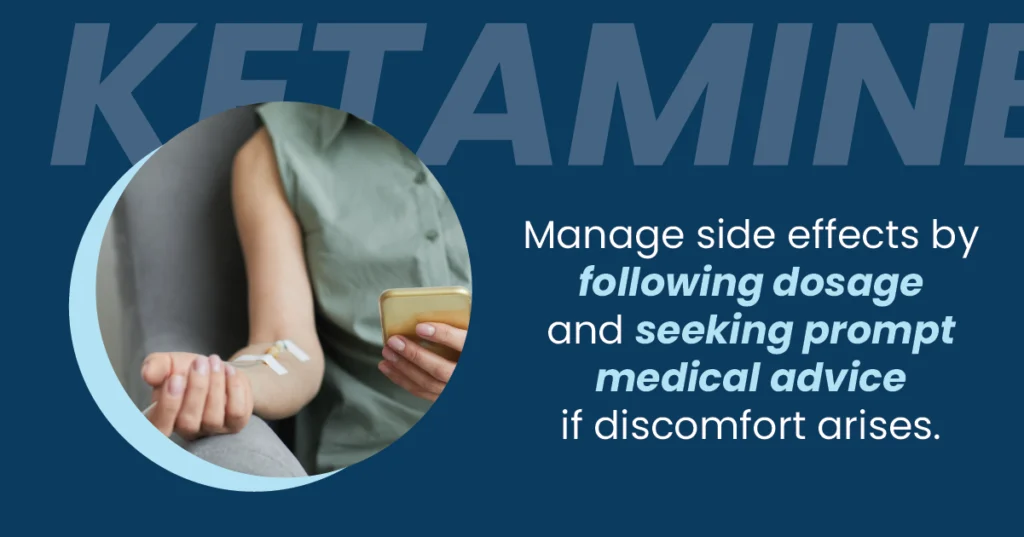Ketamine therapy, a novel tack to mental health treatment, has gained attention for its potential benefits. This anesthetic-turned-psychedelic is explored as a remedy for various mental health conditions, administered under medical supervision. Proponents highlight its rapid efficacy in alleviating symptoms of depression, anxiety, and PTSD.
However, like any medical intervention, ketamine therapy is not without potential side effects. This brief guide will provide essential information about the side effects associated with ketamine therapy, offering a balanced perspective for those seeking a deeper understanding of this evolving therapeutic option.
Key Takeaways
Like any medical intervention, Ketamine therapy is not without potential side effects. Here’s what you need to know:
- Immediate physical side effects may include nausea and dissociation during ketamine infusion.
- The relationship between dosage and side effects is vital, stressing the need for personalized dosing for optimal therapeutic benefits.
- Manage side effects by following dosage and seeking prompt medical advice if discomfort arises.
The Haven Detox-South Florida offers comprehensive services, prioritizing individualized care and a supportive environment on the journey to recovery. Contact us at (561) 328-8627 to explore our beneficial services.
What is Ketamine
Ketamine is a medication used for anesthesia and pain relief in medical settings. It can also be misused for its hallucinogenic effects.
Medically, it’s administered by professionals, but misuse can lead to health risks. Effects include altered perception and dissociation from reality. Regular misuse may harm the bladder and mental health. It’s not physically addictive, but psychological dependence can occur.
In the U.S., it’s a Schedule III controlled substance, pointing out it has medical uses but potential for abuse. Misuse can result in legal consequences. If prescribed, use it strictly as directed by a healthcare professional.
Benefits of Ketamine Therapy
Ketamine therapy, when administered by professionals, shows promise in treating severe depression, anxiety, and PTSD. It works quickly, often providing relief when other treatments fail.
The therapy involves low doses of ketamine, impacting mood regulation and neural connections positively. Some find improvements after just one session. It’s important to note that this isn’t a cure, and individual responses vary.
Research on its long-term effects is ongoing. In the U.S., ketamine therapy is legal, but it’s essential to seek it from qualified healthcare providers to ensure safety and effectiveness. Always consult with a healthcare expert before considering this therapy.
Understanding Ketamine Therapy
Ketamine therapy utilizes the anesthetic’s unique properties to alleviate symptoms swiftly. A comprehensive understanding of this evolving therapeutic method includes how it works and the conditions it treats.
How Does Ketamine Therapy Work?
Ketamine’s mechanism of action involves modulating glutamate, a neurotransmitter associated with learning and mood regulation. By enhancing neural connections, ketamine promotes neuroplasticity, potentially rewiring dysfunctional circuits implicated in mood disorders. This rapid onset of action distinguishes ketamine from other treatments, offering a promising alternative for those with treatment-resistant conditions.
Conditions Treated with Ketamine Therapy
Ketamine therapy is employed in treating various mental health conditions, like major depressive disorder (MDD), bipolar disorder, and chronic pain. Its efficacy extends to suicidal ideation, where prompt reliKetamine’sial. Research is ongoing to explore its potential in treating other psychiatric disorders, broadening its scope as a versatile therapeutic option.

Common Side Effects of Ketamine Therapy
Ketamine therapy, while offering rapid relief for mental health conditions, may entail side effects. While generally well-tolerated, immediate and long-term effects warrant examination to ensure informed decision-making for people seeking this innovative treatment.
Immediate Physical Side Effects
While generally well-tolerated, immediate physical side effects during ketamine infusion may include nausea, elevated blood pressure, and dissociation. These effects are usually short-lived and subside as the infusion concludes. Medical supervision under doctors during the procedure ensures prompt intervention if any adverse reactions occur.
Long-term Physical Side Effects
Concerns about potential long-term physical side effects remain a topic of discussion. Prolonged and frequent ketamine use may impact liver function, highlighting the importance of careful monitoring and adherence to recommended treatment protocols. However, conclusive evidence regarding lasting physical effects is still evolving.
Psychological Side Effects
Delving into ketamine therapy requires a closer look at its psychological impact. While transient effects are common, scrutiny is essential to understand potential long-term consequences thoroughly.
Immediate Psychological Side Effects
The acute psychological effects of ketamine, such as hallucinations and altered perceptions, are transient and part of its therapeutic process. Clinicians manage these effects by creating a controlled and supportive environment. Patients are advised to avoid making significant life decisions during this period to ensure a clear perspective.
Long-term Psychological Side Effects
Long-term psychological effects, if any, are under scrutiny. Some concerns involve potential dissociative states or flashbacks, yet research is inconclusive. Rigorous monitoring of patients and ongoing research endeavors aim to elucidate the impact of ketamine therapy on long-term mental well-being.
Side Effects and Dosage: What’s the Connection
Guiding the landscape of ketamine therapy involves understanding the intricate link between dosage and side effects. Tailoring the dose to individual needs is pivotal for optimizing therapeutic benefits while minimizing risks.
How Dosage Affects Side Effects
The relationship between ketamine dosage and side effects is crucial in optimizing therapeutic outcomes. Higher doses may raise the risk of adverse reactions, stressing the necessity of personalized dosing. Clinicians meticulously tailor dosage to individual needs, prioritizing efficacy while minimizing potential side effects.
Safety Measures with Dosage Regulation
Ensuring the safety of ketamine therapy involves rigorous adherence to dosage guidelines. Regular assessments of patient response and potential dosage modifications result in a personalized treatment plan. Comprehensive medical evaluation before initiation and continuous monitoring ensure a balanced therapeutic efficacy and safety approach.
Is Ketamine Therapy Worth the Side Effects?
The debate surrounding ketamine therapy centers on a crucial question: Is the rapid relief it offers worth the potential side effects? Examining both perspectives is vital for informed decision-making.
Pros and Cons
The discussion regarding ketamine therapy revolves around evaluating its advantages versus its potential adverse effects. Proponents emphasize its rapid action, particularly in alleviating severe depressive symptoms where traditional medicines may fall short. Critics raise concerns about the lack of long-term data and the potential for misuse, urging a cautious approach to widespread adoption.
Expert Opinions
Experts acknowledge ketamine’s unique position in mental health treatment but stress the need for further research. While optimistic about its immediate impact, they underscore the importance of long-term studies to assess both therapeutic benefits and potential risks.
As research progresses, expert opinions will play a pivotal role in shaping guidelines for responsible and effective ketamine therapy.
Managing the Side Effects
Managing the possible side effects of ketamine therapy involves several strategies. Firstly, it’s essential to obey the prescribed dosage and schedule provided by a ketamine clinic or healthcare professional.
Lower doses may minimize adverse effects. Discuss ongoing medications, drugs, or health conditions with medical professionals to ensure compatibility.
In case of discomfort, seek medical advice promptly. Ketamine’s role in the treatment of major depression is a valuable addition, but it’s crucial to communicate openly with healthcare providers about any concerns. Overall, personalized guidance and monitoring at a ketamine clinic can enhance the effectiveness and safety of the treatment.
Frequently Asked Questions (FAQ)
Are there any severe side effects that can happen with ketamine therapy?
Ketamine infusion therapy is utilized for treatment-resistant depression and post-traumatic stress disorder. Administered through a nasal spray or infusion, it differs from typical antidepressants.
While generally safe, there are potential short-term side effects, including changes in vital signs like heart rate and high blood pressure. Respiratory depression may occur in rare cases, requiring immediate medical attention. Clinical trials suggest benefits, but caution is advised for individuals with substance use disorders or high alcohol intake.
Subanesthetic doses can lead to temporary dissociation. Patients must be monitored, especially those with suicidal thoughts. Consulting healthcare professionals is crucial for assessing individual suitability and managing adverse reactions.
Can ketamine therapy lead to addiction or dependence?
Ketamine therapy, when used as prescribed, usually doesn’t lead to addiction or dependence. Unlike some substances, it’s less likely to create a strong desire to keep using.
However, misuse or frequent self-administration can increase the risk of dependence. Clinicians carefully monitor doses in therapy sessions to prevent this.
Individuals with a history of substance abuse need to discuss it with their healthcare provider before starting ketamine therapy. Always follow medical advice and attend therapy sessions to minimize potential risks. If concerns arise, consult with a healthcare professional promptly.
Renewed Wellness With The Haven Detox-South Florida
Embark on a transformative journey to recovery with The Haven Detox-South Florida, where we understand the profound impact of addiction on individuals, disrupting lives and well-being.
Our commitment to providing comprehensive services begins with a detoxification process that guides you through the initial phase, helping your body eliminate harmful toxins. Immerse yourself in a nurturing residential environment that fosters mental and physical well-being, providing a foundation for lasting recovery.
We go beyond traditional methods by offering targeted IV therapy, revitalizing your body, and promoting recovery by replenishing essential nutrients. In addition, our SMART Recovery is a science-based approach that empowers individuals with practical skills for lasting sobriety.
Don’t wait any longer. Take the first step towards a healthier, brighter future. Contact us at (561) 328-8627 today.








